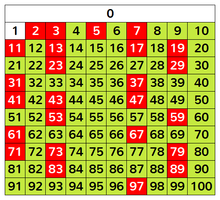Composite number
A composite number is a natural number whose prime factorization consists of at least two factors. They are thus the counterpart to the prime numbers . As well as more general primes in rings , such as B. the whole or the Gaussian numbers are examined, composite numbers can also be considered there.
definition
Be and . Then there is an unambiguous product of prime numbers (except for the order of the factors) , so that with prime numbers , whereby individual prime numbers can also appear several times ( with ). is composed if and only if .
properties
- With the exception of the numbers zero and one , every natural number is either prime or composite.
- Every positive even number except two is a compound.
- Compound numbers can also be referred to as near-primes of at least the second order .
- The numbers 0 and 1 are neither prime nor composite. While the 0 is completely excluded from these considerations, the empty product is assigned to the 1 .
- The sequence of composite numbers begins with: 4, 6, 8, 9, 10, 12, 14, 15, 16, 18, 20, 21, 22, 24, 25 ... (sequence A002808 in OEIS )
sentences
- Fundamental theorem of arithmetic
- For every composite number :, see also Wilson's theorem










